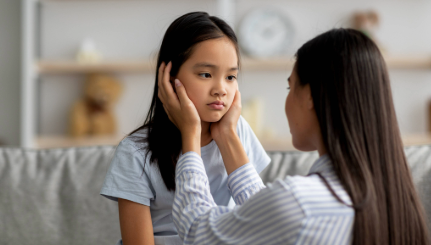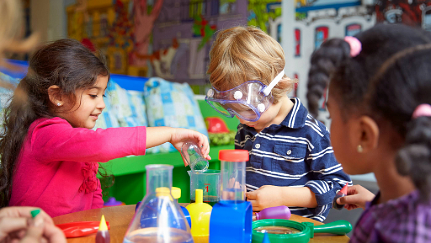
Schools, playgrounds and childcare facilities are full of energy and fun — and they’re also full of kids’ germs. You can’t shield your child from every cold that’s going around, but you can do your best to fight sniffles, sore throats and tummy aches by following these 8 germ prevention tips.
How to stop the spread of germs
1. Choose facilities wisely
It’s important to review the health and safety guidelines of any school or day care before enrolling your child. Be sure kids are encouraged to wash their hands with soap and warm water throughout the day, especially before and after playing outside or eating.
Ask staff members how frequently they sanitize tables and toys. Make sure the area where sick kids rest is away from the rest of the group, and find out whether the facility alerts parents when a child is sent home sick.
2. Vocalize your cleanliness concerns
If anything ever seems amiss at school or day care, address your concerns with the supervisors and explain your expectations for cleanliness. If the facility can’t change its policies, consider choosing an alternative.
3. Keep a clean home
Clean environments in day cares and schools can help prevent the spread of germs, and the same applies in our own homes. One simple task that can cut down on germs is regularly sanitizing areas that are frequently touched, such as doorknobs and light switches. Keeping bathrooms clean is also important, because bodily fluids can spread illness. [1] Childproofing can also help reduce opportunities for cuts or wounds that could become infected.
4. Keep hands clean
Washing hands is one of the best ways to prevent the spread of germs. The ideal method is to scrub wet, soapy hands, including the backs of the hands, between fingers and under fingernails, for at least 20 seconds, or as long as it takes to sing “Happy Birthday” twice. Frequent hand-washing is ideal, especially before and after eating, after using the bathroom, and after blowing your nose, coughing or sneezing. [2]
Hand sanitizer can be another good way to cut down on germs, but there are a few guidelines to keep in mind.
- If hand-washing is possible, choose that over hand sanitizer
- Hand sanitizer should contain at least 60% alcohol
- Apply sanitizer according to label directions and rub hands until they’re dry, about 20 seconds
- Supervise children to ensure proper use and prevent swallowing [3]
Another powerful germ-control strategy is to teach children to cough and sneeze into the crook of their elbow instead of into their hands.
5. Help your kids learn not to touch their faces
Kids (and adults) tend to touch their faces frequently, and doing that after coming into contact with germs is one way illnesses can spread. Because this is a habit that can be hard to break, there are a few things that can help, such as giving kids a stress ball, a fidget spinner or something else to hold, and ensuring that they have tissues nearby to use when needed. [4]
6. Ask everyone to remove their shoes near the front door
Having a no-shoes house helps keep it cleaner. Shoes can bring in germs as dirt, allergens and chemicals. Leaving footwear by the entrance helps cut down on your family’s exposure. [5]
7. Disinfect school supplies and electronics
Two categories that can benefit from regular cleaning are school supplies and electronics. Cleaning and disinfecting things such as lunch boxes, water bottles and folders can help eliminate germs that migrate from school. Electronics, such as phones, tablets and computers, are handled frequently and are good candidates for frequent cleaning. [1]
8. Call in sick
According to the Centers for Disease Control (CDC), kids shouldn’t go to school or day care with any of these symptoms:
- fever
- vomiting
- diarrhea
- respiratory virus symptoms that are staying the same or getting worse
The same goes for grown-ups. Set a good example and stay home when you’re sick. [6]
How to prevent the spread of germs when kids are sick
If your child is already sick, you’ll want to step up your germ-fighting efforts to prevent yourself or another member of the family from becoming sick. Here are some additional things you can do:
- Avoid sharing meals with children who are sick
- Up your disinfecting efforts, focusing on any surfaces that the sick child often uses
- Do laundry more frequently, especially bedding and towels
- If the sick child has siblings, do your best to reduce the amount of contact they have; this includes sharing items, such as books
Help keep your kids happy and healthy
There’s no foolproof way to avoid germs, but following the tips above can go a long way in helping your kids stay happy and healthy. Get more articles and resources about family life.
Sources:
[1] “Prevent the Spread of School Germs at Home,” thecleaningauthority.com/blog/healthy-living/prevent-the-spread-of-school-germs-at-home/ (accessed May 2025).
[2] “About Handwashing,” cdc.gov/clean-hands/about/index.html (accessed May 2025).
[3] “Hand Sanitizer Guidelines and Recommendations,” cdc.gov/clean-hands/about/hand-sanitizer.html (accessed May 2025).
[4] “Hands Off! How To Stop Touching Your Face,” health.clevelandclinic.org/how-to-stop-touching-your-face (accessed May 2025).
[5] “Wearing Shoes in the House: ‘OK’ or ‘No Way’?” health.clevelandclinic.org/wearing-shoes-in-the-house-is-a-bad-idea (accessed May 2025).
[6] “When Students or Staff are Sick,” cdc.gov/children-and-school-preparedness/php/interventions/when-students-or-staff-are-sick.html (accessed May 2025).
Disclaimer:
The information included is designed for informational purposes only. It is not legal, tax, financial or any other sort of advice, nor is it a substitute for such advice. The information may not apply to your specific situation. We have tried to make sure the information is accurate, but it could be outdated or even inaccurate in parts. It is the reader’s responsibility to comply with any applicable local, state or federal regulations. Nationwide Mutual Insurance Company, its affiliates and their employees make no warranties about the information nor guarantee of results, and they assume no liability in connection with the information provided. Nationwide, the Nationwide N and Eagle and Nationwide is on your side are service marks of Nationwide Mutual Insurance Company. © 2025 Nationwide



